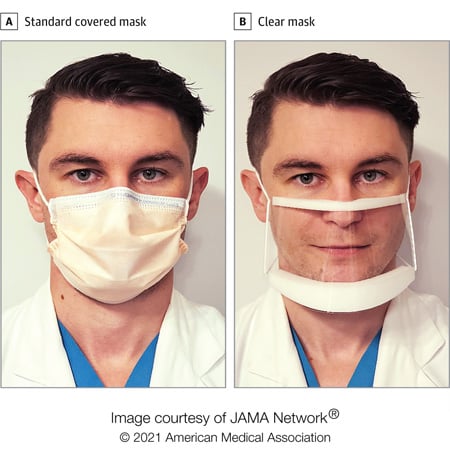Effective patient-physician communication is crucial for developing trust, explaining complex concepts, and engaging patients in shared decision-making while also recognizing concerns and expectations. A key component to communication, though, is nonverbal communication—such as facial expressions—which has been disrupted during the COVID-19 pandemic by mask wearing.
A study published in JAMA Surgery points to the effectiveness of clear masks as a way to overcome this perceived barrier to effective communication. When surgeons wore clear masks rather than the standard covered masks, patients rated their surgeon significantly higher in providing understandable explanations, demonstrating empathy, and eliciting trust.
Fifteen surgeons from a single academic institution were recruited by email. Before each clinic day, surgeons were randomized to wearing a clear or standard mask for each of their new patients, donning each mask type about half the time.
Last fall, 200 patients took part in this study. Each patient took a scripted, 10-question survey adapted from the Clinician and Group Consumer Assessment of Healthcare Providers and Systems survey. Other questions were added to assess surgeon empathy and trust, as well as a rating on the physician’s mask.
“Wearing clear versus covered masks suggests that not seeing the surgeon’s face negatively affects patient understanding, perceived empathy and trust,” says the study. “These findings should alert surgeons, because patient perceptions may not be detectable without purposeful attention to communication. We must make every effort to protect the sacred physician-patient relationship during these unprecedented times.”
Enhanced communication and trust
Overall, 93% of patients answered positively to the survey questions on communication, empathy, and trust. For the standard mask group, several questions were answered positively about 70% to 80% of the time. But for all questions, the clear-mask group answered positively at the same or greater frequency than the standard mask group.
The clear-mask group also had significantly more positive responses when answering two questions: Did the surgeon explain things in a way that was easy to understand, and did he or she seem to know the important information about the patient’s medical history?
On the explanation question, 95% of patients with surgeons wearing a clear mask said the doctor was easy to understand, compared with 78% of the patients whose surgeon donned a standard mask. Regarding the surgeon’s knowledge, 100% of patients in the clear-mask group responded positively, compared with 78% in the standard mask group.
Additionally, 99% of patients in the clear-mask group reacted positively about a surgeon’s empathy, compared with 85% in the covered mask group. Similarly, says the study, 94% of patients in the clear-mask group more frequently reported trusting their surgeon’s decisions, compared with 72% for the standard mask patient group.
Patient excitement for clear masks
When asked about their impressions of the type of mask, 100% of the patients whose surgeon wore a clear mask had positive ratings. For standard masks, 72% of patients responded positively.
Patients were also asked to provide comments about their surgeon’s mask. Their opinions about clear masks were 93% were positive with one saying, “The clear mask was great. You should keep using it.” Only 5% of responses about the standard mask were positive, with many patients stating that they “don’t like masks” or that they were “sick of these masks.”
Mixed results from surgeons
Surgeons were also asked about their preference for mask type, with only 47% responding favorably to wearing clear masks compared to wearing standard masks during patient encounters. One-quarter of the surgeons said they would wear a clear mask if their patients preferred it.
However, many of the surgeons who took part in the study noted their own discomfort with the clear masks. They didn’t seem to fit as well, and they would fog up. Several surgeons also voiced concerns about the perceived level of protection provided by a clear mask even though the protection rating is equivalent to that of standard covered masks.
The AMA has created two explainer documents for patients covering COVID-19 transmission and wearing face masks.




